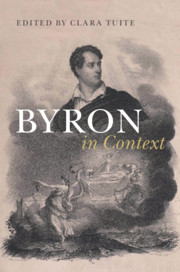Book contents
- Byron in Context
- Byron in Context
- Copyright page
- Dedication
- Contents
- Illustrations
- Contributors
- Chronology
- Abbreviations and Note on the Text
- Introduction
- Part I Life and Works
- Part II Political, Social and Intellectual Transformations
- Chapter 7 Politics
- Chapter 8 War
- Chapter 9 Greece’s Byron
- Chapter 10 Byron’s Italy
- Chapter 11 Orientalism
- Chapter 12 Religion
- Chapter 13 Natural Philosophy
- Chapter 14 Sexuality
- Chapter 15 Libertinism
- Chapter 16 Fashion, Self-Fashioning and the Body
- Part III Literary Cultures
- Part IV Reception and Afterlives
- Further Reading
- Index
Chapter 12 - Religion
from Part II - Political, Social and Intellectual Transformations
Published online by Cambridge University Press: 04 October 2019
- Byron in Context
- Byron in Context
- Copyright page
- Dedication
- Contents
- Illustrations
- Contributors
- Chronology
- Abbreviations and Note on the Text
- Introduction
- Part I Life and Works
- Part II Political, Social and Intellectual Transformations
- Chapter 7 Politics
- Chapter 8 War
- Chapter 9 Greece’s Byron
- Chapter 10 Byron’s Italy
- Chapter 11 Orientalism
- Chapter 12 Religion
- Chapter 13 Natural Philosophy
- Chapter 14 Sexuality
- Chapter 15 Libertinism
- Chapter 16 Fashion, Self-Fashioning and the Body
- Part III Literary Cultures
- Part IV Reception and Afterlives
- Further Reading
- Index
Summary
“I deny nothing, but doubt everything,” Byron wrote of his religious views in 1811 (BLJ 2: 136). The complexity of Byron’s religious thought, with its apparent contradictions, its changing nature over time and the deliberate facetiousness with which he often addressed such topics, all make it difficult for commentators to categorize his views. Similarly, the modern loss of sensitivity to questions of theological detail that to Byron were clear and self-evident has meant that many conflicting labels have been applied to Byron’s references to religion in his verse and prose. This chapter considers Byron’s shifting and multiple religious identifications and sympathies, from his engagement with Calvinism to his deism, agnosticism, skepticism and sympathies with Catholicism and Islam, not only in relation to his biography but also within the complex landscape of religious belief and the politics of religion in the Romantic period.
- Type
- Chapter
- Information
- Byron in Context , pp. 101 - 108Publisher: Cambridge University PressPrint publication year: 2019

